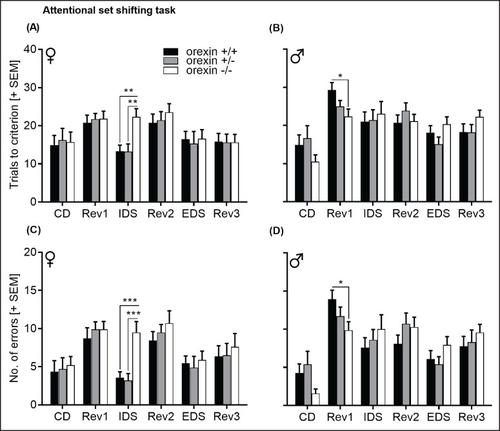当前位置:
X-MOL 学术
›
Genes Brain Behav.
›
论文详情
Our official English website, www.x-mol.net, welcomes your feedback! (Note: you will need to create a separate account there.)
Orexin deficiency modulates cognitive flexibility in a sex‐dependent manner
Genes, Brain and Behavior ( IF 2.5 ) Pub Date : 2020-10-17 , DOI: 10.1111/gbb.12707 Archana Durairaja 1 , Markus Fendt 1, 2
Genes, Brain and Behavior ( IF 2.5 ) Pub Date : 2020-10-17 , DOI: 10.1111/gbb.12707 Archana Durairaja 1 , Markus Fendt 1, 2
Affiliation

|
Cognitive flexibility is an important executive function and refers to the ability to adapt behaviors in response to changes in the environment. Of note, many brain disorders are associated with impairments in cognitive flexibility. Several classical neurotransmitter systems including dopamine, acetylcholine and noradrenaline are shown to be important for cognitive flexibility, however, there is not much known about the role of neuropeptides. The neuropeptide orexin, which is brain‐widely released by neurons in the lateral hypothalamus, is a major player in maintaining sleep/wake cycle, feeding behavior, arousal, and motivational behavior. Recent studies showed a role of orexin in attention, cognition and stress‐induced attenuation of cognitive flexibility by disrupting orexin signaling locally or systemically. However, it is not known so far whether brain‐wide reduction or loss of orexin affects cognitive flexibility. We investigated this question by testing male and female orexin‐deficient mice in the attentional set shifting task (ASST), an established paradigm of cognitive flexibility. We found that orexin deficiency impaired the intra‐dimensional shift phase of the ASST selectively in female homozygous orexin‐deficient mice and improved the first reversal learning phase selectively in male homozygous orexin‐deficient mice. We also found that these orexin‐mediated sex‐based modulations of cognitive flexibility were not correlated with trait anxiety, narcoleptic episodes, and reward consumption. Our findings highlight a sexually dimorphic role of orexin in regulating cognitive flexibility and the need for further investigations of sex‐specific functions of the orexin circuitry.
中文翻译:

食欲素缺乏以性别依赖的方式调节认知灵活性
认知灵活性是一项重要的执行功能,是指适应行为以应对环境变化的能力。值得注意的是,许多脑部疾病与认知灵活性受损有关。包括多巴胺、乙酰胆碱和去甲肾上腺素在内的几种经典神经递质系统被证明对认知灵活性很重要,但是,关于神经肽的作用知之甚少。由下丘脑外侧神经元在大脑中广泛释放的神经肽食欲素是维持睡眠/觉醒周期、进食行为、唤醒和激励行为的主要参与者。最近的研究表明,食欲素在注意力、认知和压力诱导的认知灵活性衰减中的作用是通过局部或系统地破坏食欲素信号传导。然而,目前尚不清楚全脑减少或减少食欲素是否会影响认知灵活性。我们通过在注意力集中转移任务(ASST)中测试雄性和雌性食欲素缺陷小鼠来研究这个问题,这是一种既定的认知灵活性范式。我们发现食欲素缺乏选择性地损害了雌性纯合食欲素缺乏小鼠的 ASST 维度内移动阶段,并选择性地改善了雄性纯合食欲素缺乏小鼠的第一个逆转学习阶段。我们还发现,这些食欲素介导的基于性别的认知灵活性调节与特质焦虑、嗜睡发作和奖励消费无关。
更新日期:2020-10-17
中文翻译:

食欲素缺乏以性别依赖的方式调节认知灵活性
认知灵活性是一项重要的执行功能,是指适应行为以应对环境变化的能力。值得注意的是,许多脑部疾病与认知灵活性受损有关。包括多巴胺、乙酰胆碱和去甲肾上腺素在内的几种经典神经递质系统被证明对认知灵活性很重要,但是,关于神经肽的作用知之甚少。由下丘脑外侧神经元在大脑中广泛释放的神经肽食欲素是维持睡眠/觉醒周期、进食行为、唤醒和激励行为的主要参与者。最近的研究表明,食欲素在注意力、认知和压力诱导的认知灵活性衰减中的作用是通过局部或系统地破坏食欲素信号传导。然而,目前尚不清楚全脑减少或减少食欲素是否会影响认知灵活性。我们通过在注意力集中转移任务(ASST)中测试雄性和雌性食欲素缺陷小鼠来研究这个问题,这是一种既定的认知灵活性范式。我们发现食欲素缺乏选择性地损害了雌性纯合食欲素缺乏小鼠的 ASST 维度内移动阶段,并选择性地改善了雄性纯合食欲素缺乏小鼠的第一个逆转学习阶段。我们还发现,这些食欲素介导的基于性别的认知灵活性调节与特质焦虑、嗜睡发作和奖励消费无关。


























 京公网安备 11010802027423号
京公网安备 11010802027423号